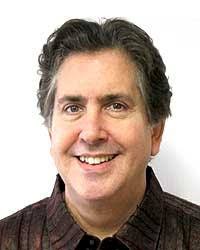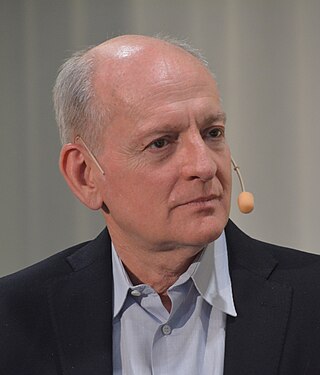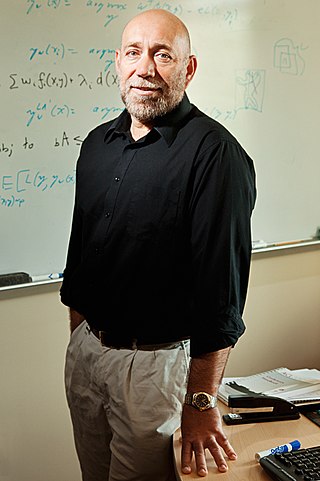Related Research Articles
Knowledge representation and reasoning is the field of artificial intelligence (AI) dedicated to representing information about the world in a form that a computer system can use to solve complex tasks such as diagnosing a medical condition or having a dialog in a natural language. Knowledge representation incorporates findings from psychology about how humans solve problems and represent knowledge in order to design formalisms that will make complex systems easier to design and build. Knowledge representation and reasoning also incorporates findings from logic to automate various kinds of reasoning, such as the application of rules or the relations of sets and subsets.
Planner is a programming language designed by Carl Hewitt at MIT, and first published in 1969. First, subsets such as Micro-Planner and Pico-Planner were implemented, and then essentially the whole language was implemented as Popler by Julian Davies at the University of Edinburgh in the POP-2 programming language. Derivations such as QA4, Conniver, QLISP and Ether were important tools in artificial intelligence research in the 1970s, which influenced commercial developments such as Knowledge Engineering Environment (KEE) and Automated Reasoning Tool (ART).

Douglas Bruce Lenat was an American computer scientist and researcher in artificial intelligence who was the founder and CEO of Cycorp, Inc. in Austin, Texas.

Stuart Jonathan Russell is a British computer scientist known for his contributions to artificial intelligence (AI). He is a professor of computer science at the University of California, Berkeley and was from 2008 to 2011 an adjunct professor of neurological surgery at the University of California, San Francisco. He holds the Smith-Zadeh Chair in Engineering at University of California, Berkeley. He founded and leads the Center for Human-Compatible Artificial Intelligence (CHAI) at UC Berkeley. Russell is the co-author with Peter Norvig of the authoritative textbook of the field of AI: Artificial Intelligence: A Modern Approach used in more than 1,500 universities in 135 countries.
Reason maintenance is a knowledge representation approach to efficient handling of inferred information that is explicitly stored. Reason maintenance distinguishes between base facts, which can be defeated, and derived facts. As such it differs from belief revision which, in its basic form, assumes that all facts are equally important. Reason maintenance was originally developed as a technique for implementing problem solvers. It encompasses a variety of techniques that share a common architecture: two components—a reasoner and a reason maintenance system—communicate with each other via an interface. The reasoner uses the reason maintenance system to record its inferences and justifications of the inferences. The reasoner also informs the reason maintenance system which are the currently valid base facts (assumptions). The reason maintenance system uses the information to compute the truth value of the stored derived facts and to restore consistency if an inconsistency is derived.
Ronald Jay "Ron" Brachman is the director of the Jacobs Technion-Cornell Institute at Cornell Tech. Previously, he was the Chief Scientist of Yahoo! and head of Yahoo! Labs. Prior to that, he was the Associate Head of Yahoo! Labs and Head of Worldwide Labs and Research Operations.

Logic in computer science covers the overlap between the field of logic and that of computer science. The topic can essentially be divided into three main areas:
Bart Selman is a Dutch-American professor of computer science at Cornell University. He has previously worked at AT&T Bell Laboratories. He is also co-founder and principal investigator of the Center for Human-Compatible Artificial Intelligence (CHAI) at the University of California, Berkeley, led by Berkeley artificial intelligence (AI) expert Stuart J. Russell, and co-chair of the Computing Community Consortium's 20-year roadmap for AI research.
The IJCAI Computers and Thought Award is presented every two years by the International Joint Conference on Artificial Intelligence (IJCAI), recognizing outstanding young scientists in artificial intelligence. It was originally funded with royalties received from the book Computers and Thought, and is currently funded by IJCAI.
Raymond Reiter was a Canadian computer scientist and logician. He was one of the founders of the field of non-monotonic reasoning with his work on default logic, model-based diagnosis, closed-world reasoning, and truth maintenance systems. He also contributed to the situation calculus.
Patrick John Hayes FAAAI is a British computer scientist who lives and works in the United States. As of March 2006, he is a senior research scientist at the Institute for Human and Machine Cognition in Pensacola, Florida.

Carl Eddie Hewitt was an American computer scientist who designed the Planner programming language for automated planning and the actor model of concurrent computation, which have been influential in the development of logic, functional and object-oriented programming. Planner was the first programming language based on procedural plans invoked using pattern-directed invocation from assertions and goals. The actor model influenced the development of the Scheme programming language, the π-calculus, and served as an inspiration for several other programming languages.
AI@50, formally known as the "Dartmouth Artificial Intelligence Conference: The Next Fifty Years", was a conference organized by James Moor, commemorating the 50th anniversary of the Dartmouth workshop which effectively inaugurated the history of artificial intelligence. Five of the original ten attendees were present: Marvin Minsky, Ray Solomonoff, Oliver Selfridge, Trenchard More, and John McCarthy.
A deductive classifier is a type of artificial intelligence inference engine. It takes as input a set of declarations in a frame language about a domain such as medical research or molecular biology. For example, the names of classes, sub-classes, properties, and restrictions on allowable values. The classifier determines if the various declarations are logically consistent and if not will highlight the specific inconsistent declarations and the inconsistencies among them. If the declarations are consistent the classifier can then assert additional information based on the input. For example, it can add information about existing classes, create additional classes, etc. This differs from traditional inference engines that trigger off of IF-THEN conditions in rules. Classifiers are also similar to theorem provers in that they take as input and produce output via first-order logic. Classifiers originated with KL-ONE frame languages. They are increasingly significant now that they form a part in the enabling technology of the Semantic Web. Modern classifiers leverage the Web Ontology Language. The models they analyze and generate are called ontologies.
The Winograd schema challenge (WSC) is a test of machine intelligence proposed in 2012 by Hector Levesque, a computer scientist at the University of Toronto. Designed to be an improvement on the Turing test, it is a multiple-choice test that employs questions of a very specific structure: they are instances of what are called Winograd schemas, named after Terry Winograd, professor of computer science at Stanford University.
Henry A. Kautz is a computer scientist, Founding Director of Institute for Data Science and Professor at University of Rochester. He is interested in knowledge representation, artificial intelligence, data science and pervasive computing.

Francesca Rossi is an Italian computer scientist, currently working at the IBM Thomas J. Watson Research Center as an IBM Fellow and the IBM AI Ethics Global Leader.

Dan Roth is the Eduardo D. Glandt Distinguished Professor of Computer and Information Science at the University of Pennsylvania.

Thomas L. Dean is an American computer scientist known for his work in robot planning, probabilistic graphical models, and computational neuroscience. He was one of the first to introduce ideas from operations research and control theory to artificial intelligence. In particular, he introduced the idea of the anytime algorithm and was the first to apply the factored Markov decision process to robotics. He has authored several influential textbooks on artificial intelligence.
Giuseppe De Giacomo is an Italian computer scientist. He is a Professor of Computer Science at the Department of Computer Science, University of Oxford, and Professor of Computer Engineering at the Department of Computer, Control and Management Engineering, Sapienza University of Rome. He is also a Senior Research Fellow at the Green Templeton College.
References
- ↑ Levesque, Hector J. "Thinking as Computation". MIT Press. Retrieved 2022-09-20.
- 1 2 "DLS - Hector Levesque". Cheriton School of Computer Science. 2017-02-16. Retrieved 2022-09-20.
- ↑ Levesque, Hector; Davis, Ernest; Morgenstern, Leora (2012-05-17). "The Winograd Schema Challenge". Thirteenth International Conference on the Principles of Knowledge Representation and Reasoning.
- ↑ "Hector Levesque receives 2020 Allen Newell Award". www.utoronto.ca. Retrieved 2022-09-20.